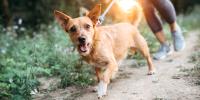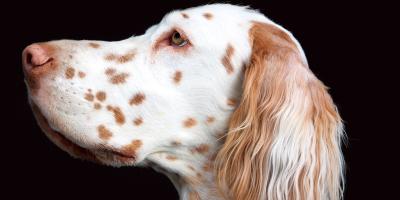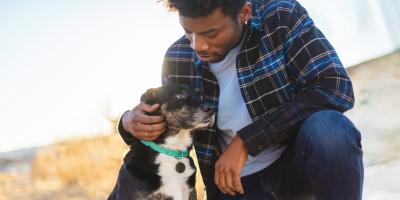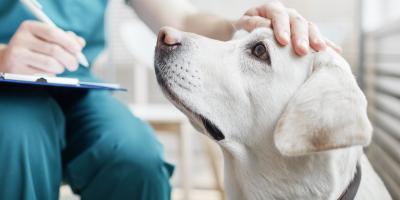Dogs sneezing can be a common occurrence, but sometimes you may notice your dog sneezing during unusual times or more than usual. In this article, we investigate the causes of sneezing in dogs and what it could mean for your dog.
A dog sneezing is common, normal and really cute to watch! But why do dogs sneeze and what does it mean?
When it comes to sneezing in dogs, it doesn’t tend to mean that your dog has a cold. In fact, dogs sneeze for a number of reasons. It can be due to something minor, like a reaction to dust, or something more serious. Or it might be a “play sneeze” – more on that later. It all depends on how often your dog is sneezing and what color the discharge is.
In most instances, your dog is sneezing in response to an irritant in the upper airway of their nose. Your dog then sneezes to expel the irritant, much like humans do. There can be many other reasons why your dog is sneezing, though, so we’ve made this guide to help answer the question of, Why do dogs sneeze?
Why Do Dogs Sneeze?
There are loads of reasons why your dog might be sneezing. It could be an irritant or allergen in their nose like dust, household products, perfume or even pollen. Sneezing in dogs can also be due to something stuck in their nose, such as dirt from digging!
If your dog is sneezing a lot, it may be a reaction to something in the atmosphere. Be careful when spraying cleaners, air fresheners or perfumes around your dog, as they may irritate your dog’s nose.
Hunting dogs and those that like to sniff around in the undergrowth can also get lots of unusual things stuck up their noses, like fragments of twigs and leaves. If your dog likes to wander nose-first through a walk in the woods or park, be on the lookout for this. Usually sneezing will help expel the item, but if your dog’s nose is bleeding or they keep pawing at their nose and sneezing, consult your veterinarian in case the object needs to be removed.
Why Do Dogs Sneeze When Playing?
Many dog owners notice that their dogs often sneeze when they are playing or excited by something. This is called “play sneezing,” and it’s normal and harmless. It just means that your dog is having loads of fun!
Dogs sneeze when playing to signal that their behavior is only play, and that they’re enjoying themselves. Sneezing when playing is particularly common in small breeds but many dogs do it. If your dog is sneezing when you’re playing together, there’s usually no need to worry.
Can Dogs Get Nasal Infections?
Usually, the reason why your dog is sneezing is a one-off reaction to something in the air or a play sneeze. However, if your pooch is sneezing regularly, it could be a nasal infection. Generally, dogs that have upper respiratory tract infections are more likely to cough than sneeze, but it’s still worth consulting your veterinarian if symptoms persist.
Aspergillus fungus is a common nasal infection caused by inhalation of a fungus from dust, hay or bits of grass. Symptoms include sneezing, nose pain, nosebleeds, discharge and visible swelling. If your dog is showing any of these symptoms, you should take them to your veterinarian as soon as possible.
On rare occasions, persistent sneezing in dogs can also be caused by nasal mites. These tiny bugs get inside your dog’s nasal passages and are more commonly picked up by dogs who dig in the dirt with their noses. Nasal mites are incredibly irritating for dogs and can cause nosebleeds and excess nasal discharge. If you suspect your dog may have nasal mites, take them to your veterinarian for treatment.
Other Reasons Your Dog May Be Sneezing:
- Infected tooth. The third upper premolar has roots that are very close to the nasal passages, so if this tooth or any teeth near it are infected, it may cause your dog to sneeze.
- Tumors. Very occasionally, persistent sneezing in dogs can be a sign of something serious, like a tumor. Second-hand smoke is a leading cause of tumors in dogs’ nasal passages and is more common in longer-nosed breeds. If you think your dog could be at risk, take them to your veterinarian for a diagnosis.
- If your dog is a brachycephalic breed. These dog breeds, such as Boston Terriers, Bulldogs and Pugs, have compressed nasal passages, so they’re much more likely to sneeze than other dogs.
When is a Sneeze Not a Sneeze?
Where dogs are concerned, a sneeze isn’t always actually a sneeze. Sometimes your dog may be snorting. If you have a healthy dog, this can be a sign of an upper airway obstruction, so you should visit your veterinarian to have it looked at. Snorting is also common if your dog is overweight, as the excess weight can make it harder for them to breathe.
Your dog may also be experiencing a reverse sneeze. This is most common in small breed dogs and brachycephalic breeds. During a reverse sneeze, air is pulled in quickly and loudly through the nose, resulting in a sudden loud noise, like a honk. In fact, some owners think it sounds like their dog is laughing. Your dog will also stand with their elbows apart, head forwards or back before making the sound. Reverse sneezing rarely requires treatment, so you don’t usually need to worry if your dog does this.
Your dog’s sneezes could also be kennel cough. If your dog’s sneezes are intense and paired with a honking, loud cough, be sure to look into the possibility of kennel cough. Contact your veterinarian if you are concerned.
For more expert tips on the health of your dog, explore our other dog symptoms articles.

Reward Yourself with myPurina
Earn and redeem rewards for Purina products with the myPurina app.








